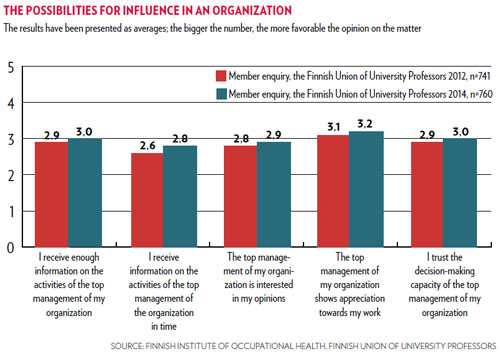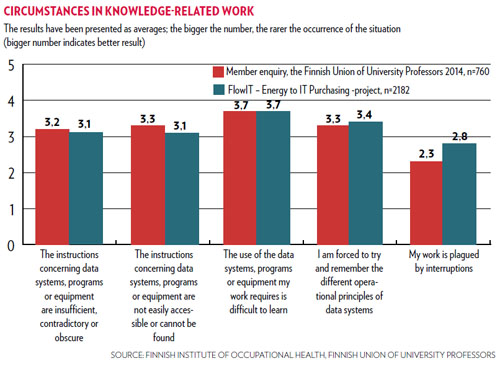
|
|||||||||||
|
Professorial Work is Becoming Increasingly ScatteredThe work of professors is interrupted more often and for longer periods of time than the work of other specialists. Continuous organizational changes are a menace in universities as well as other research institutes. Last spring, the Finnish Union of University Professors and the Finnish Institute of Occupational Health conducted a joint member enquiry, which concentrated on the working conditions of professors, resourcing of the work and general wellfare. The percentage of those who answered was 48%, which is higher than the average percentage of answers in these kinds of enquires. The amount of those who answered was slightly higher than in the corresponding member enquiry from the year 2012. You can influence your own work, but you have less influence on the organization as a whole The functionality of the closest work community has increased slightly in two years. Could it be that the turmoil caused by the University reform is calming down? Especially the flow of information within the work commmunity shows signs of positive development. There is also ever so slightly positive change of direction concerning the compiling of the common rules of the game and the encouraging working athmosphere. 71% of the professors who answered the enquiry have managerial duties or are otherwise in the position of leadership. Professors have superiors, too. Assessments concerning the undertakings of the immediate superior have not changed in two years. The popularity of performance appraisals has gone down after the corresponding enquiry of the year 2012. The possibilities of influencing personal work were considered to be significantly better than the possibilities of influencing the functioning of the organization as a whole. There has been positive development, however: the estimates of the professors on the possibilities of having influence on their organizations were better than two years ago. Those respondents who reported that they belong to the board of their university naturally had better estimates of their possibilities to influence. Membership in the governing bodies was, however, not always a quarantee for better chances to influence: the members of the University Collegiate Council, Academic Council or Department Council did not feel that they had in any way better chances to influence than those who do not belong to these bodies. In light of the results from the enquiry, top management is still relatively unconcerned about the opinions of professors. The assertion ”I receive information on the activities of the top management in time” did not get high numbers (on a scale of 1—5, the average was 2,8). Two years ago the corresponding number was 2,6, so there evidently has been some betterment in the flow of information. Assisting personnel has vanished The shortage of assisting personnel is as alarming as it was two years ago. This was emphasized especially in the open answers, of which there were plenty — over 400. Assisting personnel in universities has been cut down and the remaining personnel has moved to a distance from the departmental community. The chair of the Finnish Union of University Professors, Maarit Valo, approaches this problem in her text in Professoriblogi, ”Professors as Office Clerks” (Professorit toimistoapulaisina), and the dissemination of the blog in social media has brought this problem more into public awareness and discussion. One professor from the University of Turku had the following comment on the situation, delivered in an open answer: ”Office secretaries, for instance, have been moved from the operational units into administrative service units. Simultaneously, for example duties concerning financial administration have multiplied in the units, which has led to a situation, in which teachers/reseachers/technical personnel performs the duties of office secretaries alongside their own duties. I am the chair of our unit, but despite this I perform daily the duties that office secretaries used to do. University reform has resulted in a situation, where the productive personnel serves the administration, and not vice versa.” Although the profit responsibility of units is on the increase, professors with management duties still do not receive the necessary amount of information concerning finances. The attitude towards the claim that ”I have at my disposal the necessary information for the following of financial matters in my position as director/head of my unit” shows a slightly favourable turn during the past two years, but there is still need for improvement. — The means for management have improved slightly. There is still room for improvement, however, when only slightly under 40% of those working in managerial duties report that they have the information on economic monitoring at their disposal, Jenni Ervasti, the senior researcher of the Finnish Institute of Occupational Health, points out. The work is more and more frequently interrupted The professors estimate that their weekly working hours add up to 51 on average. This is almost ten hours more than with people doing knowledge-related work on average. The professors report a large amount of interruptions that disturb their work (80%). This is more than in the previous enquiry. Especially large amount of interruptions was reported by women, young academics and those who are in a managerial position. Among factors influencing working conditions, the opacity of data systems, programs and the equipment manuals, as well as trying to perform too many things at the same time and moving between different tasks, were among the reasons for continuous interruptions. It also seems that there are more interruptions than with experts on average. In the data from the Better Working Community (Parempi Työyhteisö) enquiry of the Finnish Institute of Occupational Health, 60% of the respondents working as specialists claim that interruptions occur relatively often or very often. Continuous extensive organizational changes In universities and research institutes, recent years have involved frequent change. As much as 79 % of the respondents had been involved in changes having to do with either the structure or the functioning of the organization during the past 1—2 years. The enquiry also contained a question on how the significance of the changes is felt. 62% of the respondents felt that the changes were at least relatively great and significant. One professor from the University of Helsinki comments on the changes as follows: ”During the recent years there have been frequent changes that are still reflected in the daily work (e.g. University reform, fusion of departments, centralizing financial issues into service center etc.). At the moment e.g. the degree reform (extensive BAs) and the Doctoral training reform are under way. There is quite simply too much development work going on all the time – there is never time to concentrate on the basic duties and you live with the feeling of inadequacy as there is no time to focus on anything properly.” A professor from a research institute: ”The organization has changed significantly. Superiors have changed, new fields of know-how have been established and emphasized, team sizes have been expanded, business mentality has been underlined even more than before, Research has to yield business transactions and added value to them is required at a shorter term than before – my own work has been part of this change and my duties have turned more towards the production of vendible solutions than scientific research results.” More enthusiasm towards work nonetheless Despite the pressure caused by work and the rapid change, professors feel joy while doing their work: the feelings of satisfaction at work, enthusiasm and attraction scored relatively high in the enquiry (on a scale of 1—5, the average was 4,1). In specialist organizations, the scale measuring joy experienced at work (satisfaction at work, enthusiastic attitude and the level of absorption) scores 3,8 (on a scale of 1—5). This would seem to indicate that the professors experience these positive feelings more often than other specialists. Professors who were over 64 year old and had thereby already passed the retirement age proved to be an especially 'work happy' group (average was 4,5). There were also minor differences according to the branch of science: in medicine and health sciences (average 4,2) and agriculture and forestry (average 4,3), the joy of work was experienced more often than in the fields of technique or natural sciences (average 4,0) The questionaire also inquired about matters concerning retirement age. The chair of the Finnish Union of University Professors, Maarit Valo, approached this issue in the editorial of the previous Acatiimi. Professors in numbersThe profile of the respondents to the Professor's work -enquiry:
Text Kirsti Sintonen
|
||||||||||

